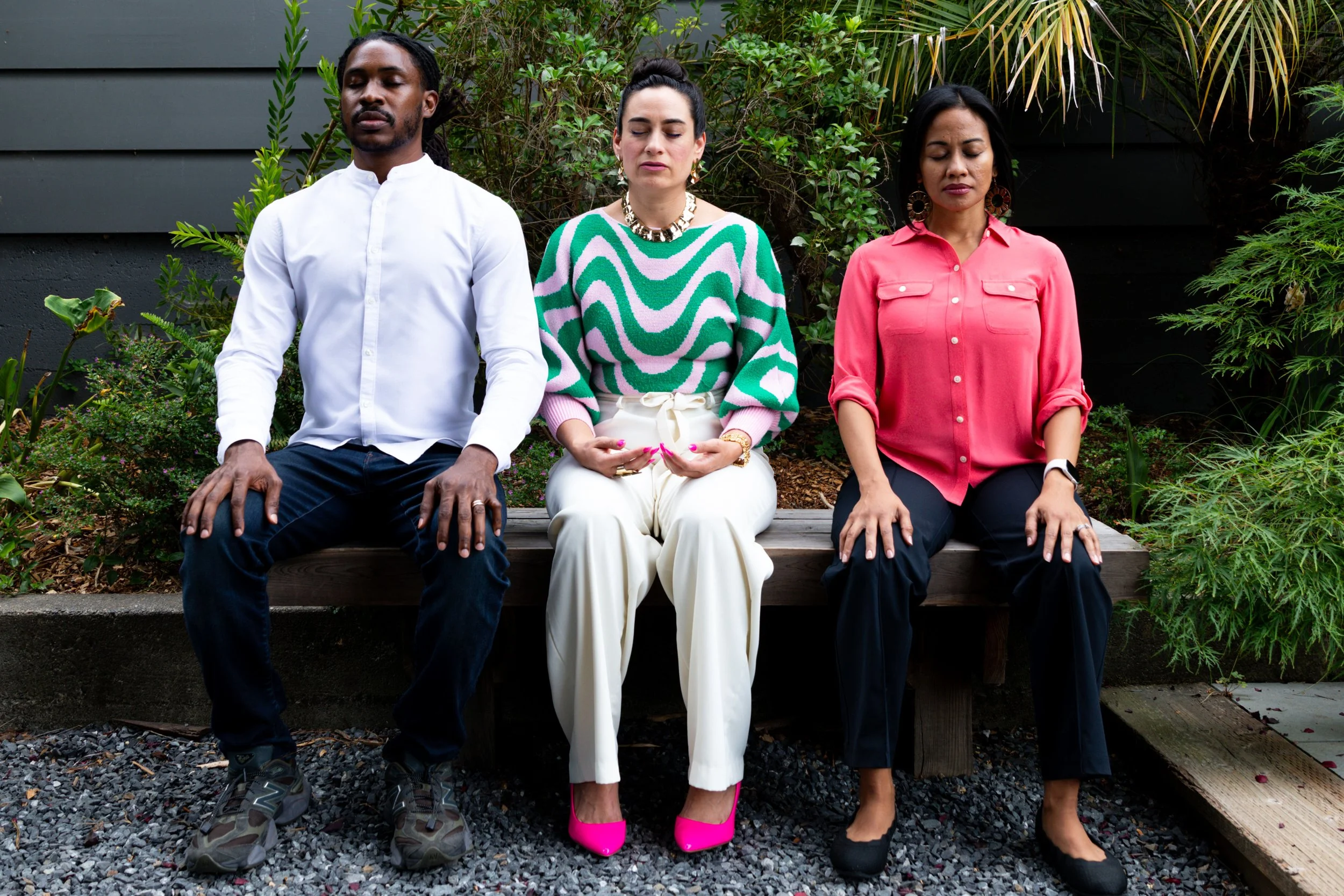Standing in Solidarity With My Black Colleagues During Black Philanthropy Month
By: Alia Peera
Click to read Part 2 in this series: What is Black Philanthropy Month and Why it Matters?
Marc Anthony, Selina Mae and Alia Co-regulating in Meditation
When the idea of me writing a blog post for Black Philanthropy Month (BPM) came up at our staff meeting I immediately froze–and real talk, I thought it was a joke! Giving major side-eyed looks to my colleagues, I responded, “Uuuh, shouldn’t our Black leader’s voices be elevated here?” Yes, I work at The Teaching Well, a Black-led organization (BLO), consisting of 92% global majority teammates and where 50% of our leadership team is Black— BPM is absolutely critical for our organization. But I kept thinking, “Honestly, y’all, WHY ME… why the Asian girl!?” I want to amplify the voice of our leader, but upon further reflection, I realize that my voice also has an important role to play in this effort.
As a first-generation Asian-American, I believe it’s vital to share my immigrant family’s story of pursuing the American Dream, which shaped my values of hard work and respect. However, these values came with the unspoken pressure to fall in line, follow the rules, stay quiet, and never be controversial. Through my racial healing journey, I've been working to unlearn this tendency to remain silent and reclaim my voice and authenticity. This is the work!
So, I do have something to say—despite my impulse to shrink right now. It’s not about being controversial or saying the “right” or “wrong” thing; it’s about speaking from a place of truth and honoring what’s on my heart and mind. First, let’s talk about BPM and why it matters to me.
Why BPM Matters to me as an Asian-American
There are many reasons and even stats that I could share around economic disparities or the racial wealth gap to build the case for giving more resources to BLO’s, but for me it's more personal. As an Asian-American, my family's ancestry and migration story are fundamental to how I see the world and relate to others. Both of my parents were the first in their families to come to the U.S., benefiting from the Immigration and Nationality Act of 1965, which allowed them to enter as students in the late '60s and '70s. This opportunity helped pave the way for their families, and eventually my siblings and I to thrive in this country. While this legislation helped many immigrant families like my parents, African American Civil Rights activists laid the groundwork for the Civil Rights Act of 1964, which, in turn, made these immigration reforms possible. All that to say, if not for the Civil Rights movement and amazing social justice trailblazers, many of whom were Black, my parents may not have been able to study, live, raise a family in the U.S., and eventually become citizens and make this country their home.
This illustrates just one of the many ways that I see our histories – those of the Black community and my ancestors – are closely intertwined. Ultimately, it's not about us versus them, but rather, how we are in community and supporting each other in our collective liberation. So yes, I stand with the Black community and believe it’s imperative we take actions to create equity and access, including giving more financial resources to BLOs. Activist Lilla Watson tells us,
“if you have come here to help me you are wasting your time, but if you have come because your liberation is bound up with mine, then let us work together.”
To be clear, it can be hard uplifting others on your journey to success, especially when we live in a society that celebrates a ‘race to the top,’ mentality or a scarcity mindset. It’s complex and very confusing at times, particularly in a racialized society. I admit growing up, I unknowingly perpetuated many Anti-Black narratives in upholding the divisive Model Minority Stereotype, because it was all that I knew and I didn't yet have the skills to interrogate my choices and actions. Now, I recognize the importance of holding up the mirror to reflect and interrogate scripts that no longer serve me, or debunk toxic narratives.
Above all, it's imperative that we strengthen, uplift, and hold each other accountable as we lean-in and work together because our liberation is bound together.
Even as one of the newest staff members at TTW, I feel truly seen– in all aspects of my identity. Our Executive Director, Lindsey Fuller, is committed to creating space where I can allow my full self to thrive and ensuring that I don't fall back to my old impulses to shrink, be silenced, or assimilate. Instead, she empowers me to embrace my strengths and contributions. For us at TTW, it’s not an either-or scenario; we are committed to creating environments where everyone can heal, be empowered, and thrive, both individually and collectively.
This is why BPM Matters to me. This is why I give my time and energy to organizations like TTW, or other values-centered Black Led Org’s alike. I believe in the power of collective action and supporting leaders that are putting justice in action. I give because values-centered organizations are what inspire and keep me going. You might be asking yourself should you give? First, ask yourself why this matters to you? And if supporting Black Led Organizations resonates with you, head on over to Part 2 of this series to learn more about Black Philanthropy Month and what you can do to stand as a co conspirator with us.

